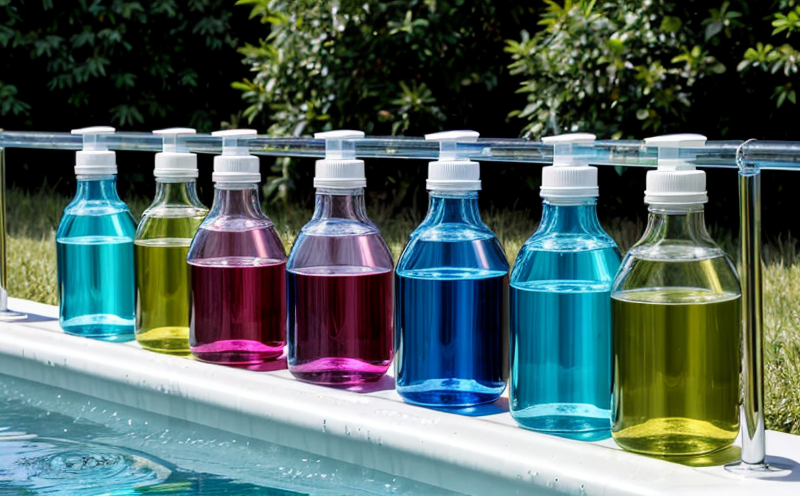ASTM D2330 pH Electrometric Test in Treated Water
The ASTM D2330 pH electrometric test is a critical procedure used to measure the acidity or basicity of treated water samples. This test is essential for ensuring that water treatment processes are effective and that the final product meets regulatory standards. The primary focus of this service is to determine the pH levels within treated water, which can significantly impact its quality and safety.
The ASTM D2330 protocol specifies a method using an electrometric titration technique. This approach involves monitoring the change in electrical potential during the addition of a standard solution. The endpoint of the titration is reached when there is a significant change in the slope of the curve, indicating that the pH has changed substantially.
Water treatment chemicals play a crucial role in this process as they are designed to neutralize water's acidity or alkalinity by reacting with it. By testing the pH after these treatments, we can confirm whether the chemicals have been effective and if the water is safe for its intended use. This test is particularly important in sectors such as drinking water supply, industrial processes, and wastewater treatment.
The standard operating procedures (SOPs) outlined by ASTM D2330 ensure accuracy and consistency across different laboratories. These SOPs include detailed instructions on specimen preparation, calibration of equipment, and the titration process itself. The use of advanced pH meters with built-in titrators ensures precision and repeatability.
The importance of this test cannot be overstated as it directly influences water quality and safety. Incorrect pH levels can lead to corrosion in plumbing systems, affect the taste and odor of drinking water, or even impact the effectiveness of disinfectants used in wastewater treatment. Regulatory bodies like the EPA (Environmental Protection Agency) mandate that treated water must meet specific pH targets.
For instance, for drinking water, the pH should generally be between 6.5 and 8.5 to prevent corrosion of pipes and minimize the formation of disinfection by-products. In industrial settings, the pH can vary widely depending on the process but still needs to be within safe limits to avoid equipment damage or product degradation.
This service is particularly valuable for quality managers, compliance officers, R&D engineers, and procurement specialists who need reliable data to make informed decisions about water treatment processes. By providing accurate pH measurements, we help ensure that treated water meets not only legal requirements but also the expectations of consumers and stakeholders.
Why It Matters
The pH level in treated water is a key indicator of its quality and safety. A balanced pH ensures that the water is neither too acidic nor too alkaline, which is crucial for various applications. For example, in drinking water, an incorrect pH can lead to issues such as taste and odor problems, increased corrosion risk, and the formation of harmful disinfection by-products.
- Corrosion Prevention: High acidity levels can accelerate metal corrosion, leading to potential leaks and contamination risks.
- Taste & Odor Control: Alkaline water can sometimes have a bitter taste or odor issues that require adjustment.
- Better Disinfection Efficiency: Optimizing the pH allows for more effective disinfection processes, reducing the risk of bacterial growth and ensuring water safety.
In industrial settings, maintaining proper pH levels is vital for process efficiency and product quality. For instance, in paper manufacturing, a neutral pH helps prevent ink bleeding on paper surfaces. In pharmaceuticals, precise pH control ensures that medications are stable and safe for consumption.
Compliance with regulatory standards is another critical aspect where this test plays a significant role. Governments around the world have established guidelines to ensure public health and environmental safety. By performing accurate pH tests, laboratories like Eurolab help clients stay compliant with these regulations and avoid potential fines or legal issues.
Eurolab Advantages
EuroLab is committed to delivering high-quality, reliable, and consistent testing services. Our laboratory adheres strictly to international standards such as ASTM D2330, ensuring that all tests are conducted under controlled conditions with precision equipment.
- Expertise & Experience: Our team of chemists and engineers has extensive experience in water treatment chemical analysis.
- State-of-the-Art Equipment: We utilize the latest pH meters and titration systems to ensure accurate measurements every time.
- Compliance & Reporting: All results are meticulously documented and reported, ensuring that clients receive clear, actionable insights into their water treatment processes.
In addition to technical proficiency, EuroLab prioritizes customer satisfaction. Our dedicated support team is always available to answer questions and provide guidance on interpreting test results. We also offer consultation services to help our clients optimize their water treatment programs.
Our commitment to excellence extends beyond just conducting tests; we actively contribute to industry best practices by staying updated with the latest developments in water quality standards. By partnering with EuroLab, you can rest assured that your water treatment processes are being monitored and improved continuously.
Why Choose This Test
- Achieves Regulatory Compliance: Ensures treated water meets stringent pH requirements set by regulatory bodies.
- Enhances Water Quality: Helps maintain the right balance of chemicals, preventing potential issues like corrosion or taste problems.
- Maintains Process Efficiency: In industrial settings, optimal pH levels can enhance production efficiency and product quality.
- Safeguards Public Health: Ensures that drinking water is safe for consumption by meeting health standards.
- Reduces Operational Costs: By preventing equipment damage and improving treatment effectiveness, this test helps lower operational costs in the long run.
- Achieves Sustainability Goals: Proper pH management can contribute to more sustainable water usage practices.
The ASTM D2330 pH electrometric test is a cornerstone of effective water treatment. By incorporating this service into your workflow, you can ensure that your treated water meets the highest standards of quality and safety, thereby enhancing trust among customers and stakeholders.





